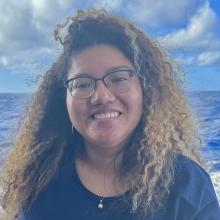
Jamie Asan
Tell us about your work/ research. What kinds of things do you do?
I specialize in investigating the chemical composition of volcanic products. Analyzing encapsulated records can inform us about the dynamics and timescales of magma reservoirs, as well as associated eruption processes. In my undergraduate work, I worked on volcanic products collected during the 2021 Cumbre Vieja eruption. As an incoming graduate student at the University of Rhode Island, for my PhD project, I will investigate global mid-ocean ridge systems to understand large-scale convention and volatile pathways in the solid Earth by using earthquake data recorded at global seismic stations paired with geochemical estimates of volatiles elements (e.g., water, and carbon dioxide) from rocks collected at mid-ocean ridges. Many of the key answers to understanding the links between the deep and shallow volatile cycles of the Earth will come from conducting quantitive analysis at the laboratories at the University of Rhode Island to determine the chemical makeup of global mid-ocean ridge basalt samples.
What sparked your initial interest in your career?
My curiosity for understanding the nature and processes of geohazards was a culmination of interest in the science and geology courses I have taken, as well as years of fostered hands-on undergraduate research experience. Throughout my undergrad, I had the opportunity to take a mineralogy course designed to immerse students in research to investigate magmatic processes associated with historical volcanism in the Canary Islands. The class provided me the opportunity to further explore applications of geochemical techniques while developing petrological skills.
Who influenced you or encouraged you the most?
The faculty within the Earth and Environmental Sciences department at Queens College were encouraging and supportive of my interests and goals. I attribute my growth as a scientist to their mentorship and guidance as an aspiring volcanologist.
What element of your work/ study do you think is the most fascinating?
The most fascinating thing I have done lately is having the opportunity to look at a thin section of a rare type of igneous rock called a phonolite under a polarizing microscope. It was really fascinating seeing the different minerals present!
How did you get involved with Ocean Exploration Trust? How did you become part of the expedition team?
I was invited as scientist from my graduate program to assist in helping to categorize rock samples that will be collected out at sea.
What other jobs led you to your current career?
Throughout my undergrad, I had many great research opportunities that introduced me to geochemical techniques that led me to my current position. With my interest in understanding the nature and processes of geohazards, I had opportunities to study sediment cores collected from Japan to study and categorize the records of the 2011 earthquake and tsunami events.
What are your degrees and certifications?
Bachelor of Science in Geology- Queens College, CUNY 2024
What are your hobbies?
I really enjoy baking! I truly enjoy trying new recipes.
What advice would you give someone who wants to have a career like yours?
One of the many great things about the field is how interdisciplinary it is! If you are interested in becoming a volcanologist, I would recommend taking a lot of science and math courses that will provide the foundation you will build on with the recommended geology courses (e.g., mineralogy, petrology). I also highly recommend reaching out to faculty members within your area/undergraduate program whose work you find interesting to inquire about any available opportunities to be involved in conducting research.
Expeditions
Jamie participated in the following Ocean Exploration Trust expeditions:
